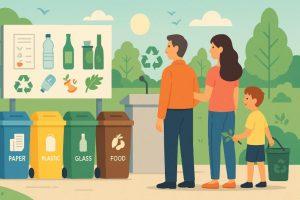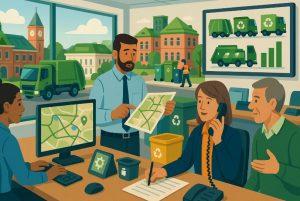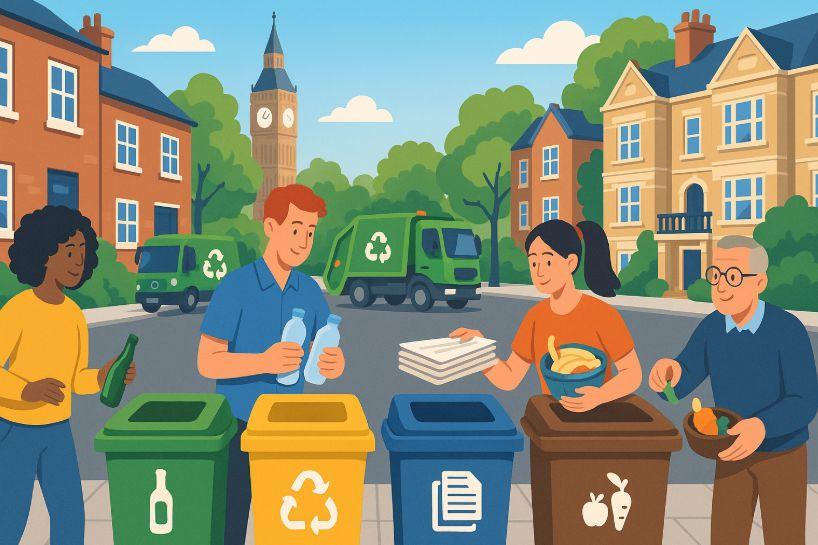In a significant move towards achieving a greener, cleaner future, the UK Government has unveiled a substantial £1.1 billion investment aimed at overhauling local recycling services across England.
This funding is designed to support councils in standardising recycling collections and enhancing waste infrastructure, in alignment with the national Environmental Improvement Plan.
With environmental sustainability and simplicity for households at its core, this investment promises to transform how communities across England particularly urban centres like London manage household waste.
Why Has the UK Government Invested £1.1 Billion in Recycling?

Delivering Simpler Recycling Across England
This £1.1 billion investment is designed to make household recycling more consistent and easier to follow across England. Recognising the inconsistencies that currently exist between different local authority areas, the government aims to standardise collections, making it easier for households to know what can be recycled, regardless of where they live.
This consistency will reduce confusion, increase participation, and ultimately improve the overall recycling rate. It’s a part of the government’s commitment to building a more circular economy, where resources are reused, repurposed, and recycled more efficiently.
Supporting the Environmental Improvement Plan
This funding initiative directly supports the UK’s Environmental Improvement Plan, which sets ambitious targets for waste reduction and sustainable resource use. By simplifying recycling, the government is making tangible progress toward achieving these targets, contributing to broader national goals for net zero emissions and environmental stewardship.
How Will This Funding Improve Local Council Recycling Services?
Investment in Equipment and Infrastructure
Local authorities will receive financial support to invest in essential recycling infrastructure. This includes the provision of new bins, collection vehicles, and sorting equipment required to implement the new recycling system. Councils will be better equipped to manage and separate different waste streams, resulting in improved recycling outcomes.
Government Support for Local Authorities
The Department for Environment, Food & Rural Affairs (DEFRA) is working closely with local councils to ensure that this funding is used effectively. The investment is being tailored to support the unique needs of each area, enabling authorities to implement changes without additional financial burden on residents.
What Is Simpler Recycling?

Nationwide Standard for Materials
The concept of Simpler Recycling revolves around creating a uniform list of recyclable materials that every local authority in England will be required to collect. This includes:
- Glass
- Metal
- Plastic
- Paper and card
- Food waste
- Garden waste
This standardisation ensures that residents will no longer face confusion over whether certain items can be recycled in their specific borough or county.
Weekly Food Waste Collections
In addition to dry recyclables, the initiative mandates the weekly collection of food waste from all households. This change aims to divert biodegradable waste from landfill, where it generates harmful methane emissions, and instead promote composting and anaerobic digestion processes.
How Will the Public Be Affected by These Changes?
Clearer Recycling Rules
One of the major benefits for the public is the introduction of clear and consistent recycling guidance. Households will be better informed about what to recycle and how to sort their waste, reducing contamination rates and improving the efficiency of recycling facilities.
Increased Collection Frequency
While collection practices vary by region today, the new funding will support more frequent and reliable recycling services, particularly for food and organic waste. Residents can expect an improved experience when it comes to waste disposal and environmental responsibility.
What Are the Key Objectives Behind This Investment?
Reducing Waste and Increasing Recycling Rates
The initiative supports the UK’s ambition to increase recycling rates, especially for household waste. By making recycling easier and more accessible, the government expects to see significant increases in participation and volumes of materials diverted from landfill.
Contributing to Net Zero Goals
Recycling more and wasting less are essential to meeting the UK’s net zero emissions targets. The £1.1 billion boost forms part of a larger environmental strategy aimed at decarbonising the waste sector and promoting long-term sustainability.
When Will These Recycling Changes Be Implemented?
Rollout Timeline
While exact timelines may vary depending on local authority readiness, the government has set clear expectations for implementation. Councils are being given time and financial support to transition by the mandated deadlines, with the first phases expected to roll out within the next couple of years.
This structured rollout ensures that services can be scaled properly, avoiding disruption while achieving environmental goals.
What Role Do Local Councils Play in the Success of This Plan?

Implementation Responsibility
Local councils are at the heart of this initiative. With funding in place, they are responsible for deploying the new recycling systems including procuring new vehicles, distributing bins, training staff, and engaging communities.
Partnership with DEFRA
The government, through DEFRA, is providing both financial and operational support. Regular communication and accountability measures are being put in place to ensure the smooth delivery of this national plan at the local level.
Breakdown of the £1.1 Billion Recycling Investment
| Investment Area | Purpose |
| Equipment & Vehicles | Purchase of bins, collection trucks, and containers |
| Infrastructure Upgrades | Improvements to local sorting and recycling centres |
| Council Support | Training and administrative capacity building |
| Public Engagement | Informing households and increasing participation |
Conclusion
The £1.1 billion recycling boost marks a pivotal moment in the UK’s environmental journey. By simplifying recycling processes, standardising waste collection, and empowering local councils, the government is laying a strong foundation for long-term sustainability.
London and other major cities stand to benefit significantly from clearer guidelines and enhanced services moving the UK closer to its net zero and environmental improvement targets. This initiative is more than just funding; it’s a bold step toward a circular economy where waste is no longer a burden but a valuable resource.
Resource:
FAQs
What is included in the simpler recycling system?
The new system includes standardised collections of glass, metal, plastic, paper, food waste, and garden waste across all local authorities.
Will all councils receive funding at the same time?
Funding is being rolled out based on council readiness and planning, with support tailored to each local authority’s circumstances.
How much funding will each council receive?
The distribution of funds is being managed by DEFRA based on the size, needs, and capacity of each local authority.
What materials will be collected under the new system?
Glass, metal, plastic, paper/card, food waste, and garden waste will all be collected separately to improve recycling quality.
Why is weekly food waste collection important?
It helps reduce methane emissions from landfill and enables more food waste to be composted or used in energy production.
Will businesses also benefit from this recycling boost?
The focus is on household waste, but councils may extend improvements to business waste services depending on local strategy.
How does this funding support the UK’s Environmental Improvement Plan?
By improving recycling infrastructure and reducing waste, the initiative supports national goals for resource efficiency and environmental protection.









Leave feedback about this